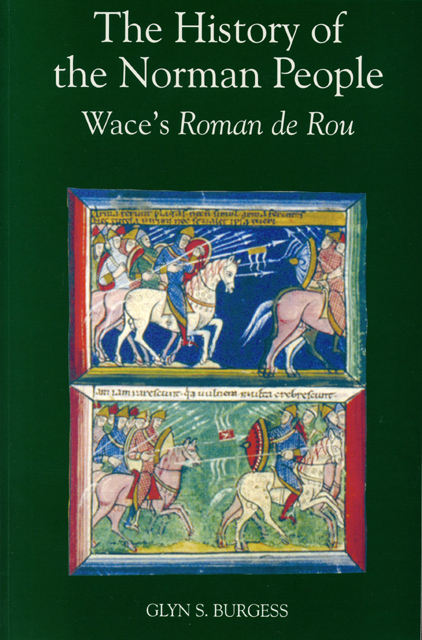Book contents
Introduction
Published online by Cambridge University Press: 21 March 2023
Summary
The Roman de Rou: text and patronage
The Roman de Rou is a long verse chronicle which narrates the history of the first dukes to rule over Normandy; for the period after 1066 it also provides an account of the first Norman kings of England. The work covers the period from the origins of Normandy, i.e. the time of Hasting and Rollo (Rou), up to the battle of Tinchebray in 1106, the year in which Henry I annexed Normandy by defeating his brother Robert Curthose. The Rou was seemingly commissioned, or at least encouraged, by Henry II, who presumably wanted Wace to compose a work of similar scope to his earlier vernacular history of the Britons, the Roman de Brut, which seems to have enjoyed great success. Wace’s new work, which was no doubt intended to be read out at Henry’s court, would provide a eulogy of both Henry and his dynasty whilst at the same time explaining how the Normans came to be in England and justifying their right to the throne. Moreover, it would not only be a history of Henry’s ancestors, but also of those of his wife Eleanor. Henry could claim descent from Rollo’s son, William Longsword, and Eleanor from Rollo’s only daughter, Gerloc, who married William III, Duke of Aquitaine (William I of Poitiers). In turning to Wace, Henry was no doubt looking for a propagandist who could assist in the celebration of both past and present glories of the Norman and Angevin dynasty and confirm him as the rightful king of England. Even in the 1160s, when Wace began his work, some English lords were still refusing to accept the right of William the Conqueror and his successors to the throne of England; in addition, some Norman lords, who had grown accustomed to the freedom afforded them by the lax rule of Henry’s predecessor, Stephen of Blois, were reluctant to offer Henry their full allegiance.
Why did Wace abandon his work?
At the close of his narrative Wace tells with obvious resentment of the abandonment of his work because a rival by the name of Maistre Beneeit had, at Henry’s behest, undertaken a similar task (III, vv. 11419–24).
- Type
- Chapter
- Information
- The History of the Norman PeopleWace's <i>Roman de Rou</i>, pp. xi - xxxivPublisher: Boydell & BrewerPrint publication year: 2004

